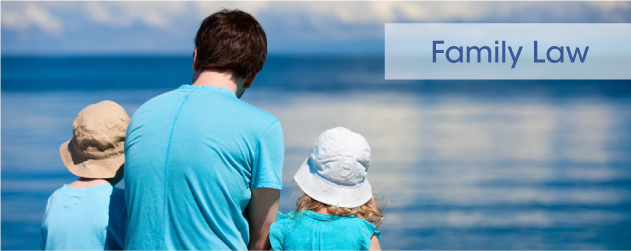Part 7 of the Children and Family Relationships Bill, published in February, 2015 deals with the proposed changes in relation to guardianship, custody, and access.

Here’s whats proposed:
PART 7 GUARDIANSHIP, CUSTODY AND ACCESS
Head 31: Definitions
This Head provides definitions for the purposes of the Part and the Act more generally. They are based in part of the definitions in section 2 of the Guardianship of Infants Act 1964 as amended, with the following key modifications: -definitions for “custody” and “access” are based on the proposed definitions for “day-to-day care” and “contact” in the Law Reform Commission Report on Legal Aspects of Family Relationships. In addition, the definition of “custody” reflects the possibility of joint / shared custody where parents are separated. The terms “guardianship”, “custody” and “access” are retained because these are used in the Constitutional amendment; – “mother” is defined as the woman who gives birth to a child, except in the cases of adoption, or where an order has been made under Head 13; – the definition of “father” from the 1964 Act (which is used for the purposes of assessing what fathers are automatically guardians of their children) now includes a category of non-marital fathers who cohabit with the child’s mother for at least 12 months prior to the child’s birth, where that cohabitation ends 57 (if applicable) not more than 10 months prior to the child’s birth. This will significantly expand the range of fathers who are automatically guardians of their children without the need to take any further action.
Head 32: Best interests of the child
This Head replicates, in subhead (1), section 3 of the 1964 Act with the modification that the “best interests” of the child, as distinct from the “welfare” are the first and paramount consideration in specified types of proceedings.
This change in language is to align with the language of the Constitutional amendment. Subhead (2) provides that 60 the court should have regard to the fact that unreasonable delay in proceedings may be contrary to the child’s best interests.
Subhead (3) sets out the factors to which a court should have regard when assessing a child’s best interests, including the child’s physical, intellectual and social needs, and further factors concerning the ability and willingness of the parents to cooperate in parenting and caring for the child.
Subhead (4) and (5) explicitly mandates the court to consider any history of family violence when assessing a child’s best interests. Subhead (6) seeks to limit the behaviour of a parent which may be considered by the court to behaviour affecting the child. This is to limit the extent to which proceedings may be used to air grievances between parents, rather than focus on the needs of the child and how the parents may best meet them. Subhead (7) specifies that the court should obtain the views of the child without – so far as is possible – putting the child in a position where s/he is subject to undue influence, including by a parent.
Head 33: Proof of paternity in certain proceedings
This Head replicates section 3A of the 1964 Act (inserted by section 10 of the 1987 Act) with the modification that subhead (1)(b) confers authority on the court to direct a person to make an application under Head 7 for a declaration of parentage and to adjourn the proceedings until the question of paternity is resolved.
Head 34: Powers, responsibilities and rights of guardianship
This Head provides a statutory interpretation for “guardianship” including providing an effective saver for the common law position in subhead (1)(c). It therefore includes all the rights and obligations of a parent (whether or not that parent is a guardian), all additional statutory powers, and any further powers under common law, including in relation to the child’s estate. It is, however, modified by the limitation in Head 36(8) which disapplies from a guardian who is neither a parent nor in loco parentis to a child any requirement to maintain the child from guardian’s own resources.
Head 35: Guardian to act in best interests of the child
Subhead (1) mandates a guardian to act in a child’s best interests. This is a new provision: current law does not expressly direct a guardian to act in the best interests of the child although it is generally assumed that a guardian will do so (particularly as most guardians are parents). However, it seems appropriate that as a directing principle, a guardian should be specifically required to act in a child’s best interest. Subhead (2) mandates a person to do what is reasonable in the best interests of a child of whom the person has custody or care, subject to the overall provisions of the scheme. This is not intended to confer additional guardianship-like powers on such a person, but to help clarify that having custody and care of a child is itself a responsibility and that the child’s best interests must be the legitimate concern of a person who has custody and care of the child.
Head 36: Guardians to act jointly
This Head sets out an obligation for guardians to act jointly (subhead (1)), unless the court limits the powers of a guardian by order (subhead (2)). Subhead (3) mandates the guardians to cooperate and to share information and provides that they may enter an agreement between them on the exercise of guardianship powers in relation to the child. Subhead (4) provides that except where the court otherwise provides, a guardian is entitled to information and to have sufficient access to the child to enable the guardian to properly exercise the function of guardianship. Subheads (5) and (6) set out the key responsibilities of guardianship in nurturing and providing for the child, and in making a range of decisions on behalf of the child including in relation to where and with whom the child lives, on the child’s general upbringing, education and medical treatment, etc. Subhead (7) requires the guardian to exercise those functions in a way which is consistent with the age and capacity of the child. Subhead (8) limits the responsibility for maintenance of the child so that a guardian who is not a parent and is not in loco parentis to a child is not required to maintain the child from the guardian’s own resources.
Head 37: Rights of parents to guardianship
This Head reproduces subsections (1) and (4) of section 6 of the 1964 Act as amended, with the modifications that Ø subhead (1) cross-refers to the exceptions made in subhead (2) and the different rule applying in Head 38 to assisted reproduction and surrogacy, and Ø subhead (2) refers to the additional category of cohabiting fathers who are automatically guardians of their children. Section 6(2) and (3), which refer to the surviving parent acting as sole guardian or together with any guardian appointed by the deceased or by the court, are substituted by Head 40. In addition, Head 44 now makes extensive provision on duration and termination of guardianship.
Head 38. Rights to guardianship in special cases of assisted reproduction and surrogacy
This Head makes special provision for the cases of assisted reproduction. Subhead (1) will cover the majority of cases: where a man and woman have a child together by means of assisted reproduction other than surrogacy, guardianship will be determined in the usual way by reference to whether they are married / cohabiting / make a statutory declaration. Subhead (2) deals with the case where the birth mother has a civil partner: if she is determined as the other parent of the child, then she shall also be a guardian: this treats her in the same way as a spouse who is determined to be the parent of a child born through AHR. Subhead (3) deals with the case of a cohabiting female partner of the birth mother who is determined to be the other parent of the child. Subject to meeting the cohabitation requirements that would apply to a father in the same circumstances, she is to be a guardian of the child. Subhead (4) sets out that where a surrogate gives birth to a child, she alone is the child’s guardian under the court declares she is not a parent and terminates her guardianship in accordance with Head 44, and declares another person or persons to be the child’s parents and appoints a guardian for the child. The intention is that the birth mother will be the child’s guardian until a new guardian is appointed, to ensure continuity of protection for the child.
Head 39: Court appointments of guardians
This Head specifies who may apply to court to be appointed as a child’s guardian. These are a parent (whether the natural father or a person declared to be a parent under Head 11 or Head 13) who is not otherwise automatically a guardian (subhead (1)), or the spouse, civil partner or cohabitant of the child’s parent, who shares responsibility for the day-to-day care of the child (subhead (3)(a)), or a person who has day-to-day care of the child and the child has no parent or guardian who is prepared to fulfill their responsibilities to the child (subhead (3)(b)). The appointment of a guardian under the section does not affect the previous appointment of any other guardian (subhead (2)). The consent of any guardian, the proposed guardian, and the child (if s/he is over 12) is required for the appointment of a guardian (subhead (4)), unless the court dispenses with the consent of an existing guardian or the child on the basis that it is in the best interests of the child to appoint the proposed guardian (subhead (5)).
Head 40: Power of parents to appoint testamentary guardians
This Head mirrors, in subhead (1), the provisions of section 6(2) and (3) of the 1964 Act although it refers to “guardian” rather than “mother” or “father” (this is not a policy change: “father” in the 1964 Act generally refers only to fathers who are guardians.) Subhead (2) allows the guardian parent of a child to appoint a 72 testamentary guardian to act on her or his behalf after her or his death (mirroring section 7(1) and (2) of the 1964 Act). Subheads (3) to (7) mirror the balance of section 7 of the 1964 Act.
Head 41: Power of guardian parent to appoint substitute guardians
This provision is intended to provide the framework for a type of “delegated guardianship”. It draws partly on the framework already established for testamentary guardianship and allows the court to intervene if there are disputes with another guardian. The facility to appoint a substitute guardian is proposed to be limited to a guardian parent who has custody of the child (and this includes shared custody). Appointment under subhead (2) is for a definite period and may be useful if, for example, a guardian will be out of the country for a specified duration and will be difficult to contact in case of any emergencies and unable to carry out normal functions such as signing consent forms or authorisations for a child to engage in particular activities. The nature of the appointment and the presumed ongoing capacity of the guardian parent justify allowing the appointment to be limited in its scope. Appointment under subhead (3) is intended to allow parents to appoint substitute guardians empowered to act in their stead should they be temporarily or permanently unable to exercise guardianship (through accident, physical or mental illness or extraordinary circumstances). 75 Subheads (4) to (6) are based on the provisions in relation to testamentary guardianship allowing a guardian parent to object to the appointment and conferring powers on the court to determine any dispute. Subhead (7) provides for the duration of an appointment as substitute guardian. Subhead (8) makes express provision for any dispute arising as to capacity of a guardian parent to resume exercise of his or her guardianship. This may be particularly useful in the case where a guardian whose capacity is compromised (through episodic mental illness / addiction issues, for example) wishes to resume guardianship duties while the substitute guardian does not consider that s/he is capable of doing so and that the child’s best interests may be compromised. Subheads (10) and (11) are safeguards so that the Child and Family Agency will be notified of the arrangement as though it were an emergency private foster care arrangement where the substitute guardian is someone other than a person normally living in a household with the child; this means that if any welfare concerns arise the Child and Family Agency will be informed and can act on them / activate care proceedings if necessary. The provision is intended to balance respect for the autonomy of the guardian parent and the family privacy of people normally living in a household with the best interests and welfare of the child.
Head 42: Appointment of guardians to replace deceased parent or guardian
This Head replicates section 8(2) to (5) of the 1964 Act as amended, and allows the court to appoint a guardian to a child if the child has no guardian. It is not considered necessary to replicate section 8(1) as the child cannot have no guardian in law unless the child’s mother, or both parents, have died, in which case the Head would have automatic effect. It is assumed that since a mother has a constitutional right to have guardianship of her child, her guardianship cannot be terminated by the court under Head 44 (although the court may still limit her exercise of guardianship powers).
Head 43: Powers and duties of guardians
This Head replicates the provision of section 10 of the 1964 Act and refers to the powers of a guardian to act for a child in a legal capacity and as manager of the child’s property. It is separate and distinct from the provisions in Heads 34-36 which are more focussed the physical, emotional, social and intellectual needs of the child, rather than the property and financial interests of the child.
Head 44: Duration and termination of guardianship
Subhead (1) elaborates the provision for removal by the court (referred to in Head 42(3)) of a guardian appointed under Head 39 or Head 40. An application may be made if there is a guardian to be appointed and the guardian to be removed consents to removal, or is unable, unwilling or has failed to exercise guardianship of the child, or the court otherwise considers it necessary or desirable. 79 Subhead (2) is intended to ensure that the child born through surrogacy always has a guardian – guardianship is vested in birth mother until the court both declares her not to be a parent and also appoints another guardian or guardians. This is to ensure protection for the child. For example, if intending parents before an application under Head 13 is determined, the court may declare the birth mother not to be a parent, declare (now deceased) intending parents to be parents, but, until it appoints guardians to act in place of the deceased, the birth mother remains the guardian. Subhead (3) provides for the duration of guardianship in all other cases.
Head 45: Applications to court concerning welfare of child.
This provision allows the court, on application to it, to review the decision of a child’s guardian where that decision may have long term consequences including as to the child’s health (subhead (1)). It extends to parties other than a child’s guardian access to court where the child’s well-being is in question but where it may not be appropriate to seek review in public law proceedings (subhead (2)). In addition, a guardian may always apply to court for direction on a matter concerning the welfare of a child (subhead (3) – based on section 11(1) of the 1964 Act).
Head 46: Applications to court by child’s parents concerning custody and access
This Head is based on certain of the provisions of section 11 of the 1964 Act. Subhead (1) is based on section 11(2)(a) which confers on the court power to rule on matters of custody and access. It is not proposed to replicate paragraph (b) of that subsection as maintenance payments are adequately dealt with in other legislation. Subhead (2) replicates section 11(3) of the 1964 Act as substituted by section 6 of the Age of Majority Act 1985. Subhead (3) is a simplified version of section 11(4) and is cast in gender-neutral terms given the potential for same-gender parents under the Scheme. Subhead (4) allows the court to determine the detailed residential arrangements of a child when granting joint custody – but only to the extent that they are not agreed between the parents – and to specify what contact the child is to have with the parent with whom, at any particular time, the child is not living (e.g. phone calls where the child is with one parent for most of the week or spends most of his or her holidays with one parent rather than the other).
Head 47: Application to a court for custody by relative of child or person acting in loco parentis
This Head allows certain persons other than a child’s parents to seek custody of the child, where the person is either a relative of the child or has been in loco parentis to the child and meets additional criteria (subhead (1)). These are reforms broadly in line with the recommendations of the Law Reform Commission. Subhead (2) sets out the additional criteria for an application on the basis of being “in loco parentis” as follows: (A) the person has been the spouse or civil partner of the child’s parent or cohabiting with the child’s parent for at least three years, and in each case has shared day-today care of the child with the child’s parent for at least two years, or (B) the person has taken care of the child on a day-to-day basis for at least 12 months and the child has no parent or guardian willing and able to exercise his or her guardianship responsibilities including taking day-to-day care of the child. In the case at (A), this would allow a person who has had a quasi-parental role in relation to a child to apply for custody, including shared custody, on the break-up of a relationship with the child’s parent; in the case at (B) where there may be problems in the child’s birth family, a person who has taken care of the child may be able to apply for legal custody. Subhead (3) restrains the court from making a custody order under the Head unless all the guardians and any subject child over the age of 12 consent to it, unless the court dispenses with the consent under subhead (4) on the basis that the child’s best interests are served by its making the order. Subhead (5) provides for the court to specify the detailed residential and contact and access arrangements, if it decides to grant joint custody of the child to a person who has been in loco parentis to a child, and the child’s parent.
Head 48: Application to court for access by relative of a child or person acting in loco parentis
This Head substitutes for the provisions under section 11B of the 1964 Act which allow certain persons to apply for access to a child. It implements a recommendation of the Law Reform Commission in removing the former “two step” process under which an applicant had first to seek leave to make the application. Subhead (1) 85 specifies that a relative or a person who has been in loco parentis may make an application. Subhead (2) specifies the factors the court must consider in deciding whether or not to make an order as they relate to the relationship between the applicant and the child, including the child’s own views. Subhead (3) additionally mandates the court to consider the best interests of the child and whether the denial of access by the child’s guardians is unreasonable.
Head 49: Additional powers of the court in relation to applications under this Part
Subhead (1) confers a general authority on the court to include conditions in orders it makes concerning guardianship, custody and access where it considers that necessary in the best interests of the child. This could include conditions as to sharing of custody, locations of access, limitations on the exercise of guardianship by one of a child’s guardians, etc. Subhead (2) and (3) are intended to place on a statutory footing a power that is sometimes used by the courts if they consider that a child’s parent may take the child to live in another country in breach of rights of custody or access of the child’s other parent. Subhead (4) does not confer any new function on the court, but is intended to serve as a clear signposting both to judges and to legal representatives of the powers already available to it under the Child Care Act 1991.
Head 50: Making of interim custody or access orders
Subhead (1) allows the court to make interim custody or access orders. This is to help address the problem that waiting lists can cause where there is a dispute about custody and access: an applicant may be denied access for a period of weeks or months, which can be very disruptive of his or her relationship with a child, particularly with a very young child. If the court has the facility to make interim orders, this can help maintain the relationship between the applicant and the child pending the full determination of the dispute. Subhead (2) provides that an interim order shall not be stayed on appeal unless the court that makes the order or the court to which the appeal is made specifically direct otherwise. A complete ban on staying an order would not be appropriate given that this would not allow the court to consider the best interests of the child concerned, but this gives a clear signal that lodging an appeal is not to constitute a stay on the order unless a stay is expressly granted.
Head 51: Power of court as to production of child
This is an updated version of section 14 of the 1964 Act. That section confers on the court the power to refuse to enforce an applicant’s rights of custody in respect of a child where it is of the opinion that the applicant has abandoned or deserted the child. The power granted under this Head varies somewhat in that if the court considers that the behaviour of a parent or guardian means it is contrary to the child’s best interests that the applicant parent have custody, it is required to refuse any right of custody to that parent. In addition, the court is given power to make whatever orders in considers appropriate in respect of guardianship, custody and access.
Head 52: Validity of separation or parenting agreements
Provide along the following lines: A provision contained in any separation or parenting agreement made between the parents of a child shall not be invalid by reason only of its providing that one of them shall give up the custody or care and control of the child to the other.




